Covid Inquiry: Sunak defends Eat Out to Help Out scheme
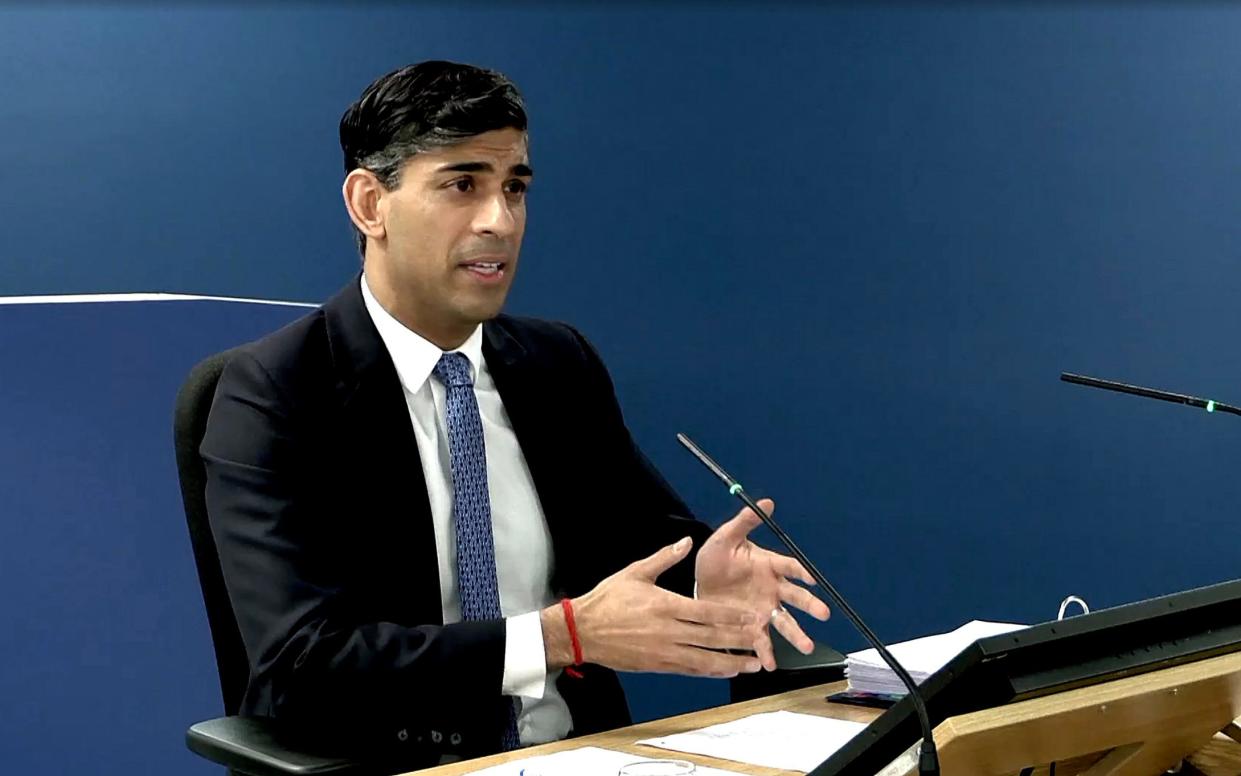
- Oops!Something went wrong.Please try again later.
Rishi Sunak has defended his Eat Out to Help Out scheme arguing it protected the country from the “devastating consequences” of mass job losses.
The Prime Minister told the Covid Inquiry that the support scheme for hospitality had been the “reasonable, sensible and the right thing to do” to protect jobs held by vulnerable people.
The scheme in summer 2020 encouraged people to dine out by subsidising food and non-alcoholic drinks from Monday to Wednesday.
Government scientists were not consulted over the scheme before it was announced and were privately critical of the move introduced while Mr Sunak was chancellor.
The inquiry has heard how Dame Angela McLean, now the Government’s most senior scientist, described Mr Sunak as “Dr Death” in an apparent reference to the scheme while Sir Chris Whitty, the chief medical officer, is said to have called it “Eat out to Help Out the virus”.
Devastating consequences
Giving evidence on Monday, Mr Sunak said that the scheme was designed to help millions of people keep their jobs.
He said: “All the data, all the evidence, all the polling, all the input from those companies suggested that unless we did something, many of those jobs would have been at risk with devastating consequences for those people and their families.”
The Prime Minister said that he did not believe the scheme was a risk and that the “onus” should have been on those who felt strongly about the policy to raise concerns “when something could have been done about it”.
“Why would I raise it as a risk when I didn’t believe that it was? Because it was designed in the context of a safe reopening,” he said.
“The onus is surely on the people who now believe that it was a risk to have raised it at the time, when something could have been done about it, if they felt strongly.”
Mr Sunak said it was “reasonable, sensible and the right thing to do” as a means of safeguarding jobs and others had “ample opportunity to raise those concerns” and did not.
The inquiry previously heard that Boris Johnson described the Treasury as the “pro-death squad” but Mr Sunak did not believe his department was “pejoratively associated with death” and he said this was unfair.
“I do not think it is a fair characterisation on the incredibly hardworking people that I was lucky to be supported by the Treasury.
“In the same way earlier, you talked about the people at Sage being motivated by doing what they thought was best in the public interest, I would say exactly the same about all the people who worked with the Treasury who worked extremely hard throughout the entire period.”
Earlier Mr Sunak said his Whatsapps from the pandemic were not available as he had changed his phone “multiple times” in recent years and not backed up his messages.
He said he was never advised to save the exchanges, despite key conversations about the Government’s response taking place via the messaging app.
He argued he was not a “prolific user” of WhatsApp anyway, and that anything of significance would have been recorded officially.
‘Operational inefficiency’
Mr Sunak was appointed chancellor in February 2020 and admitted that he “didn’t know the prime minister particularly well” but that relationship “grew over time and you know both of us living in the same building”.
As the pandemic unfolded he said he spent more time with the former prime minister than his family.
“I mean, I saw the prime minister probably more than I saw my own wife for this period of time,” he said.
However Mr Sunak said he was not aware of concerns about decision making or chaos in Downing Street. Dominic Cummings, Mr Johnson’s most senior adviser, referred to him as a “trolley” while Sir Patrick Vallance, the Government’s former chief scientific adviser, said the ex-prime minister presided over “operational inefficiency”.
Responding to questions from Hugh Keith KC, the Prime Minister said: “You said ‘debate raged’. I don’t necessarily think that is a bad thing.
“It is right that there was vigorous debate because these were incredibly consequential decisions for tens of millions of people in all spheres.
“Whether it was health, education, economic, social or the long-term impact, these were incredibly big decisions, the likes of which no prime minister had taken in decades, if ever.”
He also told the inquiry that the debate about the fiscal and economic implications of lockdown did not happen “particularly extensively” before the first lockdown “because everything happened very quickly and was largely being driven by public health advice”.
In relation to non-pharmaceutical interventions such as lockdowns he said that “we could have had a broader conversation from the beginning about some of these things”.
Mr Sunak used the start of his evidence to apologise to bereaved families, some of whom sat in the room, and those who suffered during the pandemic.
He said: “I just wanted to start by saying how deeply sorry I am to all of those who lost loved ones, family members, through the pandemic, and also all those who suffered in various different ways throughout the pandemic and as a result of the actions that were taken.
“I’ve thought a lot about this over the past couple of years. It’s important that we learn the lessons so that we can be better prepared in the future.”
The inquiry’s second module on key decision making will hear closing submissions on Wednesday.
04:38 PM GMT
The Covid Inquiry finishes
The Covid Inquiry has ended for the day, completing the oral evidence for part two of proceedings.
Thanks for following The Telegraph’s live coverage. Check the website for the latest updates.
04:26 PM GMT
Lawyer for one of Inquiry’s core participants reprimanded by Baroness Hallett
The lawyer for one of the Inquiry’s core participants has been reprimanded by Baroness Hallett for making an “inappropriate” comment to the Prime Minister.
Leslie Thomas KC, representing the Federation of Ethnic Minority Healthcare Organisations (FEMHO), cut across the Prime Minister while he was answering a question on the Eat Out to Help Out scheme, saying: “I know that you wouldn’t be trying to talk me down on the clock”.
Baroness Hallett, the chair of the inquiry, interrupted Mr Thomas’s questioning to say: “I think that comment was inappropriate”. She told Mr Sunak to ignore the comment made by the counsel about deliberately trying to talk him down.
03:25 PM GMT
Sunak not aware Downing Street believed Treasury associated with death
Mr Sunak said he was not aware that officials in Downing Street believed the Treasury was “pejoratively associated with death”.
Asked by Mr Keith about officials referring to the Treasury as the “pro-death squad”, Mr Sunak said he was not aware of this and it was unfair.
“I wasn’t and I do not think it is a fair characterization on the incredibly hardworking people that I was lucky to be supported by the Treasury. In the same way earlier, you talked about the people at Sage being motivated by doing what they thought was best in the public interest, I would say exactly the same about all the people who worked with the Treasury who worked extremely hard throughout the entire period.”
03:19 PM GMT
Being 'violently opposed to lockdown' is an unfair characterisation, says Sunak
Rishi Sunak said it was “not a fair characterisation” by Hugo Keith KC that he was “violently opposed to a lockdown”.
Mr Keith suggested that Mr Sunak was supportive of the position in October 2020 that the country should not go into a national “firebreak lockdown”, saying the then Chancellor “of course would have been violently opposed to a lockdown.”
Mr Sunak replied: “I think that’s not a fair characterization of my position. I was opposed to a circuit breaker in September because I didn’t think it would have achieved its stated objectives, something that I think most people now acknowledge to be the case and I’ve seen in evidence, people now accepting that it wouldn’t have prevented the need for a second lockdown.
“It didn’t work in Wales, where it was tried. So I was specifically opposed to a circuit breaker again, in terms of violently opposed to lockdowns is not an accurate characterization of my position.”
03:15 PM GMT
Less consensus among Sage than suggested, says Sunak
Rishi Sunak told the Covid Inquiry he does not think the country understood that there was less consensus among the Scientific Advisory Group for Emergencies (Sage) than was being put forward.
He said: “I think Sage’s views were presented as a consensus or a single view.
“I think there was definitely not an accurate perception of the degree of debate - that lack of consensus - within Sage.”
He added: “ I think, in hindsight and reflection, it probably would be good to have made sure that there was a broader awareness of that point.”
03:08 PM GMT
Onus on those who felt strongly about Eat Out to Help Out to raise concerns, says Sunak
Rishi Sunak has said he does not believe the Eat Out To Help Out scheme was a risk and that the “onus” should have been on those who felt strongly about the policy to raise concerns “when something could have been done about it”.
Mr Sunak said: “Why would I raise it as a risk when I didn’t believe that it was? Because it was designed in the context of a safe reopening.
“The onus is surely on the people who now believe that it was a risk to have raised it at the time, when something could have been done about it, if they felt strongly.”
He added: “I’m very clear that I don’t believe that it was, because hospitality had been deemed to be safe to reopen with a considerable - as I said - hundreds of pages of guidance, changes in practice, and had been recommended by think tanks, and had been done by countries elsewhere.”
The Prime Minister said it was “reasonable, sensible and the right thing to do” as a means of safeguard jobs.
“But if others are suggesting that they didn’t, they had ample opportunity to raise those concerns in forums where I was there, or where the Prime Minister or others were, and they didn’t.”
02:34 PM GMT
Concerns about Eat Out to Help Out were not raised, says Sunak
Mr Sunak said that others in government had the chance to raise concerns about the scheme but never did.
He said there were three meetings that happened after the announcement of Eat Out to Help Out but no one including the Chief Scientific Advisor or Chief Medical Officer raised concerns.
“I don’t recall and the minutes do not suggest that it was raised at all in the three precise meetings,” he said.
02:31 PM GMT
People who disagreed with Eat Out to Help Out had 'ample opportunity' to raise concerns
Mr Sunak said people who disagreed with Eat Out to Help Out had “ample opportunity” to raise concerns with him, but they never did.
“This was a very reasonable, sensible policy intervention to help safeguard those jobs in that safe reopening. That was my view. I didn’t believe that it was a risk. I believe it was the right thing to do.
“But if others are suggesting that they didn’t, they had ample opportunity to raise those concerns in forums where I was or where the prime minister or others were. And they didn’t,” he told the inquiry.
02:22 PM GMT
Eat Out to Help Out needed to protect jobs, says Sunak
Mr Sunak defended the Eat Out to Help Out scheme to support restaurants saying it was needed to protect jobs.
“My primary concern was protecting millions of jobs of particularly vulnerable people who worked in the industry.
“All the data, all the evidence, all the polling, all the input from those companies suggested that unless we did something many of those jobs would have been a risk with devastating consequences for those people and their families, and that’s why independent think tanks had recommended something like that.”
02:21 PM GMT
Sunak defends not consulting scientists over Eat Out to Help Out
Rishi Sunak has defended not consulting scientists or the Secretary of State for Health over his Eat Out to Help Out scheme in 2020.
Asked why Eat Out to Help Out was not run by Sage, the chief medical officer, or Matt Hancock, Mr Sunak told the inquiry: “Because the eat out to help out had been designed specifically in the context of the safe lifting of NPIs that had already been signed off, as we’ve talked about before, as part of the main plan, which had reopened hospitality - indoor hospitality.”
He added: “Eat Out to Help Out only operated within that context, and indeed, there were a significant range of other NPIs that were in place including social distancing, COVID secure guidance, tables service, contactless ordering, one-way systems, all of which have been put in place, but the overall reopening of vendor hospitality has already been implemented.”
The Prime Minister said his scheme was a “micro policy to make sure that the capacity, which the scientists had already said was part of an overall package which could be safely delivered, was actually used.”
02:02 PM GMT
And we're back from Lunch
The Covid Inquiry has resumed and Hugo Keith KC has begun questioning the Prime Minister about the reduction from two metre social distancing to just one metre.
01:58 PM GMT
Comment: Eat Out to Help Out is the best thing Rishi’s done
Ask me to be grumpy about Rishi Sunak and I have multiple avenues of angst available to take you down. In fact, there is almost no major political issue on which he would win my approval. But his Eat Out To Help Out policy, unleashed when Sunak was Chancellor after the first Covid lockdown had finished in summer 2020, is an exception, writes Patrick O’Flynn.
Read the full article here.
01:08 PM GMT
Inquiry takes break for lunch
The Covid Inquiry has taken a break for lunch and will resume at 1.55pm.
01:07 PM GMT
Opening hospitality first would ‘make school teachers feel better not being first’, Inquiry hears
Rishi Sunak wanted to open hospitality before schools because it would “make school teachers feel better not to be first”, the inquiry heard.
An email sent by the former chancellor’s principal secretary in May 2020 said: “Obviously when we say hospitality to open - we mean this in a new/SD way.
“Therefore we need hospitality to open in Summer (July) ... and to stage things ... this means open sectors now, schools early June, and non-essential between the two (mid-May).
“Also will make schoolteachers feel better not to be first.”
Asked about the order of reopening, Mr Sunak told the inquiry: “My recollection was that there was quite a lot of resistance from the sector about schools coming back.
“I think that parents were also concerned and there was an issue that many school teachers were themselves either isolating or impacted, and actually it would be very difficult to have schools open in full. All that was part of the mix.”
01:05 PM GMT
Too many people ended up working from home, says Sunak
Rishi Sunak has said too many people ended up working from home during the pandemic due to Government communication errors.
When questioned about the Treasury’s concerns related to over-compliance with the Government’s stay-at-home messaging, Mr Sunak said the public had not understood “sufficiently clearly that they should go to work only if they could not work from home...?”
The Prime Minister said there was work to get Government communications “right” on the topic after the first lockdown.
12:47 PM GMT
Sunak said ministers were ‘following advice from scientists’ during pandemic
Rishi Sunak has repeated the argument that ministers were “following advice from the scientists” during the Covid crisis.
“My strong recollection from this period is that the government acted, I think almost immediately, on the recommendations from Sage (Scientific Advisory Group for Emergencies),” he said.
The Prime Minister said the group advised on “substance and timing”.
12:39 PM GMT
People have forgotten the pandemic was to blame for the high tax burden the country is now facing, says Sunak
Mr Sunak said people had forgotten the pandemic was to blame for the high tax burden the country was now paying.
“I think it’s important, and this is always tricky in public policy, is many of these impacts are not felt immediately, they’re felt over time, and that is always a tough thing to deal with when you’re communicating, but as it turned out we were able to borrow what we needed to fund the pandemic response.
“The impact of having to pay it back only comes after the fact when everyone forgets why it was necessary and the consequences of that as we have an historically high - you know, a tax burden that is higher than I would like, that is a direct consequence of the support that was provided during the pandemic and later on. But as I said, those things were often hard to get across, but they’re all contained in the statement”.
12:15 PM GMT
Pictured: Sunak questioned at Inquiry
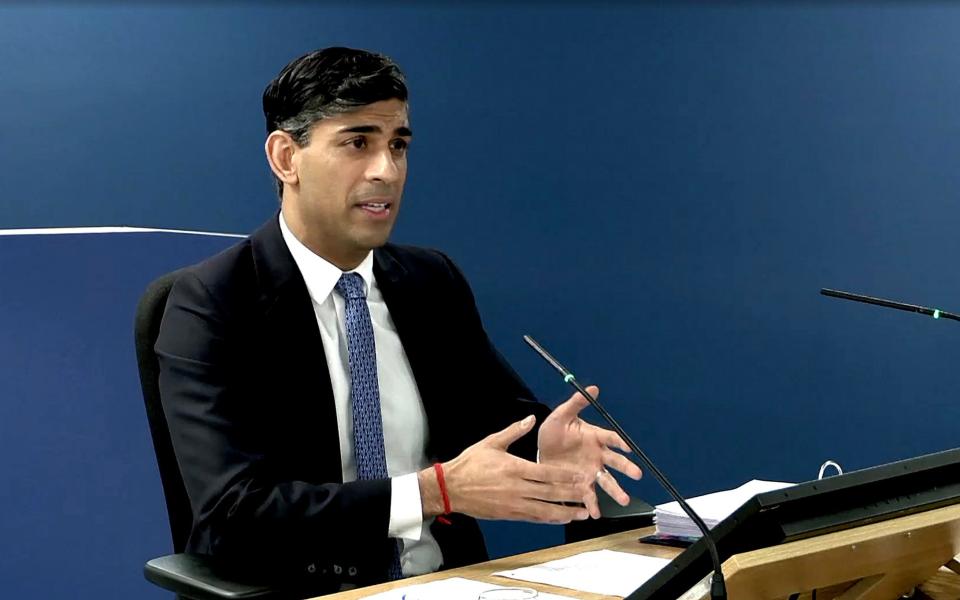
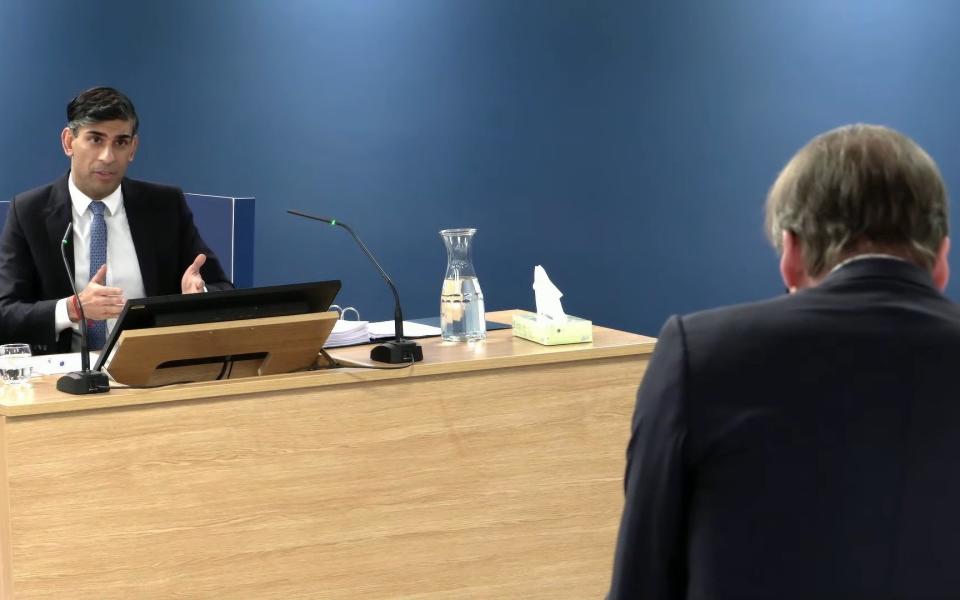
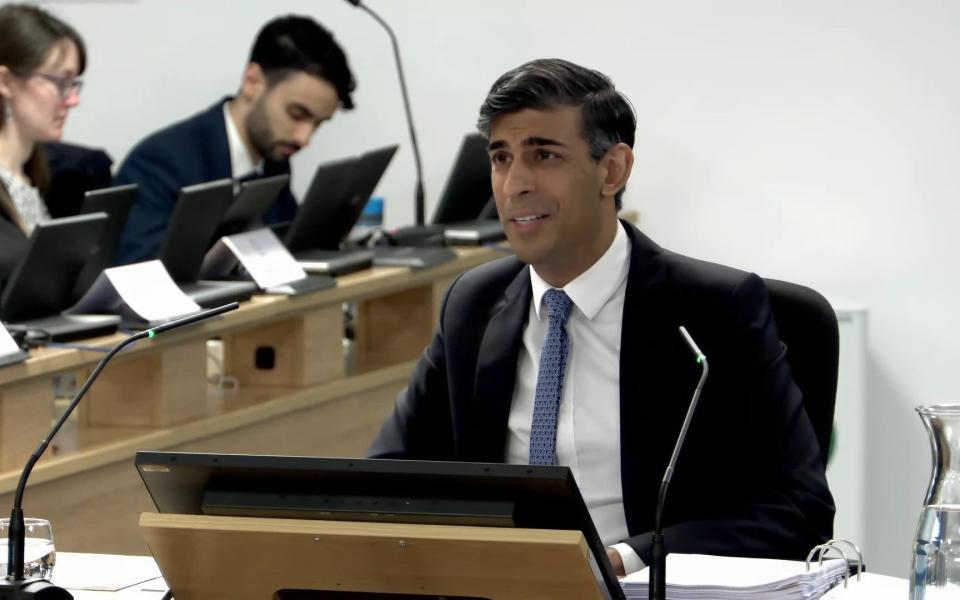
12:02 PM GMT
Sunak can't recall Cabinet meeting where it was decided to lock down
Mr Sunak said he could not recall the Cabinet meeting where it was decided the country would go into lockdown or what debate took place.
“I can’t precisely recall that particular meeting but as I said the track record of all those meetings, 16th, 18th, 20th and 23rd was the government following the scientific advice that was put in about the right NPIs to implement and at what time based on protecting the NHS”
11:58 AM GMT
Sunak: Not good data at start of pandemic
Mr Sunak said there was not enough good data at the start of the Covid crisis on the impact on the NHS in order to make decisions.
“One of my more general reflections on this area ... is about data and access to good data. I think it’s very clear that early on, there just wasn’t the quality and timeliness of the data in all areas that you would have liked in order to make decisions. I think that that’s clear.”
He told the inquiry that although access to and quality of data has now improved, he believes the data was “not as good as it could have been at the beginning” and “that would be a big lessons learned for me”.
11:56 AM GMT
Sunak unaware of 'operational inefficiency' comments in Downing Street
Rishi Sunak was asked by Hugo Keith KC during the Covid Inquiry about evidence from others, including Sir Patrick Vallance, that Boris Johnson presided over “operational inefficiency”.
Mr Keith asked: “Were you aware that his closest advisers had seemingly unanimously taken the view that there was a lack of efficiency, that the administration was described privately as brutal and useless, or criminally incompetent or operationally chaotic? Was any of that known to you?”
Mr Sunak replied: “I don’t think any of those comments were shared with me at the time.”
He added that he thought it was “right that there was vigorous debate because these were incredibly consequential decisions for tens of millions of people in all spheres...”
11:45 AM GMT
Criticism of Boris Johnson over Downing Street operations ‘not shared with me at the time’, says Sunak.
Mr Sunak was asked about criticism of the prime minister’s decision making and comments from advisors suggesting Downing Street was chaos.
“I don’t think any of those comments were shared with me at the time,” he said. “You made the point Mr Keith that debates raged. I don’t think that is necessarily a bad thing.”
“It’s right that there was vigorous debate because these were incredibly consequential decisions for tens of millions of people, in all spheres, whether it was health, whether it was education, whether it was economic, whether it was society, whether it was long-term impacts, these were incredibly big decisions the likes of which no Prime minister had taken in decades, if ever, like this”.
11:28 AM GMT
Sunak: Impossible for every conversation between cabinet ministers to be recorded
Rishi Sunak told the Inquiry it is “clearly impractical” for all conversations between cabinet ministers to be recorded.
Speaking about his interaction with Boris Johnson during the pandemic, Mr Sunak said: “If I was having lunch with my family in the garden at the same time that the prime minister was, on a typical weekend in Downing Street, then we would obviously be chatting as we were barbecuing.
“I think it is genuinely impossible for every single conversation between two cabinet ministers, whoever they are, to be recorded.”
11:21 AM GMT
Sunak snubs claims about dysfunction in Number 10, saying operations felt 'fine'
Asked about “dysfunction in Number 10”, Mr Sunak said: “Obviously I didn’t work directly in Number 10 or in the Cabinet Office, so it’s hard for me to comment on that other than to say that my interactions with Number 10 and the Cabinet Office during this period felt fine to me.”
He said he didn’t feel he had been “shut out or not able to participate” in discussions during the pandemic, and that he was able to “input advice to the prime minister”.
Mr Sunak said his primary recollection of this period is that the prime minister, “largely acted on the advice that was put in front of him from Sage with regard to what interventions to implement at one time”.
“My strong recollection of this period is the advice would come in from Sage, obviously that advice changed over the weeks, which I’m sure we’ll get into, but largely my recollection is the Government acted on the advice that was given with regard to interventions, and the economic advice as you’ve pointed to, was provided, I’d say not just for information, that’s to downplay it, but it was not driving the conversation,” the Prime Minister told the Inquiry.
11:14 AM GMT
Sunak didn't know prime minister well when he became chancellor
Mr Sunak said he “didn’t know the prime minister particularly well” when he first became chancellor.
“Obviously I didn’t know the Prime Minister particularly well at this point in time when I became chancellor, obviously that relationship grew over time and you know both of us living in the same building.”
11:10 AM GMT
Sunak saw Johnson more than his own wife, Inquiry hears
Rishi Sunak said he saw Boris Johnson more than his wife during the pandemic.
He said: “I mean, I saw the prime minister probably more than I saw my own wife for this period of time.”
Asked whether he had opportunities to make his views on Covid restrictions known to the then-prime minister, Mr Sunak told the Inquiry: “As a general rule, I always felt that I could.
“We were working very closely together as I was with my other Cabinet colleagues, and as a general rule I was able to participate in everything that I felt I needed to in order to get the evidence, analysis, to him in a way that he could use it to make decisions.”
11:06 AM GMT
Sunak: First few weeks of pandemic extremely difficult
Asked if the Cabinet Office was a gearbox with sand in it at the start of the pandemic as described by Dominic Cummings Mr Sunak said “those first few weeks were extremely difficult for everybody”.
“I don’t doubt that everyone was trying very hard to do the best that they could in trying circumstances, dealing with something that we hadn’t dealt with before.”
11:03 AM GMT
Sunak denies he described clash between public and economic health during pandemic
Rishi Sunak has denied he described a clash between public health and the economy during the Covid crisis.
Asked by Hugo Keith KC about the “clash between public health, epidemiological considerations and economic and fiscal issues”, and his position, Mr Sunak said: “I don’t think I ever referred to it as a clash.
“I think I saw my role as chancellor of the exchequer as making sure that the prime minister had the best possible advice, information, analysis relating to the economic impact or consequences of some of the decisions that he was having to make.”
He added: “It wasn’t - I didn’t ever describe it as - a clash just between public health and economics. I think that’s to think about it in far too narrow a way.”
10:52 AM GMT
Sunak doesn't have access to WhatsApp messages from pandemic, Inquiry hears
Mr Sunak said he was not a “prolific” user of WhatsApp and messages had been lost after he changed his phone several times.
The Prime Minister said that he did not have access to WhatsApp communications from around the time of the pandemic as he had changed his phone “multiple times over the last few years”.
Hugo Keith KC said: “Your phone, you said, doesn’t retain, and nor do you have access to, text messages at all relating to the period of the crisis.
“In addition, you said although on occasion you use WhatsAapp to communicate around meetings and logistics and so on, you generally were only party to WhatsApp groups that were set up to deal with individual circumstances such as arrangements for calls, meetings and so on and so forth. You don’t now have access to any of the WhatsApps that you did send during the time of the crisis, do you?”
Mr Sunak replied: “No, I don’t, I’ve changed my phone multiple times over the past few years and, as that has happened, the messages have not come across.
“As you said, I’m not a prolific user of WhatsApp in the first instance - primarily communication with my private office and obviously anything that was of significance through those conversations or exchanges would have been recorded officially by my civil servants as one would expect.”
10:42 AM GMT
Sunak: Deeply sorry to all those who lost loved ones in the pandemic
Rishi Sunak apologised to “those who lost loved ones” and to “all those who suffered throughout the pandemic” as he began his evidence at the Covid Inquiry.
“It’s important that we learn the lessons so that we can be better prepared in the future,” the Prime Minister added.
“And in that spirit, with enormous respect for all of those who are here today, I look forward to giving evidence and in very constructive candour to help the inquiry with its deliberations.”
10:35 AM GMT
Sunak sworn in
Rishi Sunak is being sworn in at the Covid Inquiry. Hugo Keith KC is leading questioning.
10:34 AM GMT
Pictured: Sunak arriving at the Inquiry
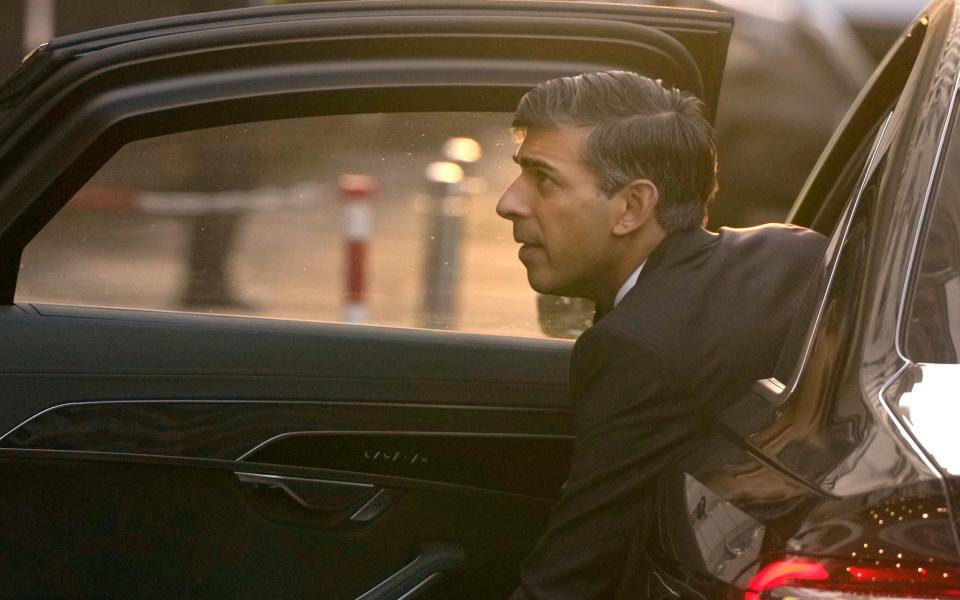
10:32 AM GMT
Quesitoning should begin any moment
Prime Minister Rishi Sunak is expected to be sworn in ahead of questioning at the Covid Inquiry any moment now.
09:37 AM GMT
Rishi Sunak due to appear at Inquiry this morning
Questioning of Rishi Sunak is due to start at 10.30am and will continue throughout the day.
09:32 AM GMT
Recap: ‘Real origins’ of Covid must be identified, Johnson tells inquiry
Boris Johnson suggested last week the “real origins” of Covid is yet to be discovered as he concluded his evidence to the public inquiry into the pandemic.
Giving evidence at the UK Covid-19 Inquiry, the former prime minister urged Baroness Hallett, who chairs the inquiry, to give a “prod to the world to get the answer” about the genesis of the virus.
It comes after Michael Gove, the Levelling Up Secretary, suggested last week that Covid could be man-made, leading Downing Street to ask the World Health Organisation (WHO) to “consider all possible avenues”.
Baroness Hallett warned that the question of where Covid originated was beyond the remit of the inquiry, and reminded Mr Johnson that it was he who had decided its scope when he set it up.
09:23 AM GMT
Covid Inquiry has ‘already decided Eat Out to Help Out was harmful’, Sunak allies claim
The Covid Inquiry has already decided Eat Out to Help Out was harmful, allies of Rishi Sunak have warned as he prepares to give evidence on Monday.
Mr Sunak, who was the chancellor during the pandemic, is expected to be questioned by Hugo Keith KC over whether his flagship programme to reopen hospitality in summer 2020 fuelled a rise in Covid-19 cases.
Read the full story by Political Correspondent Dominic Penna here.
09:22 AM GMT
Pictured: Sunak arrives at Covid Inquiry
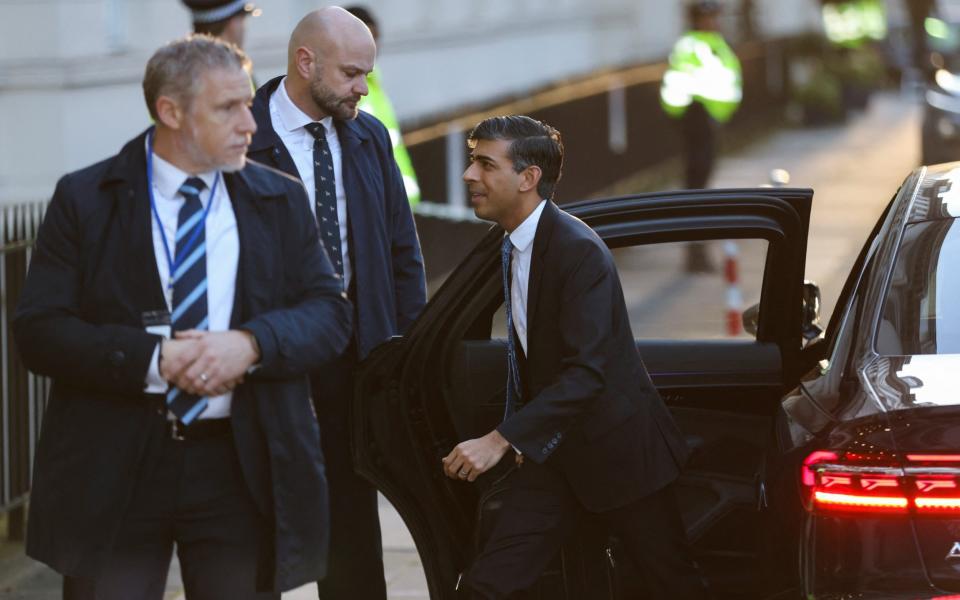
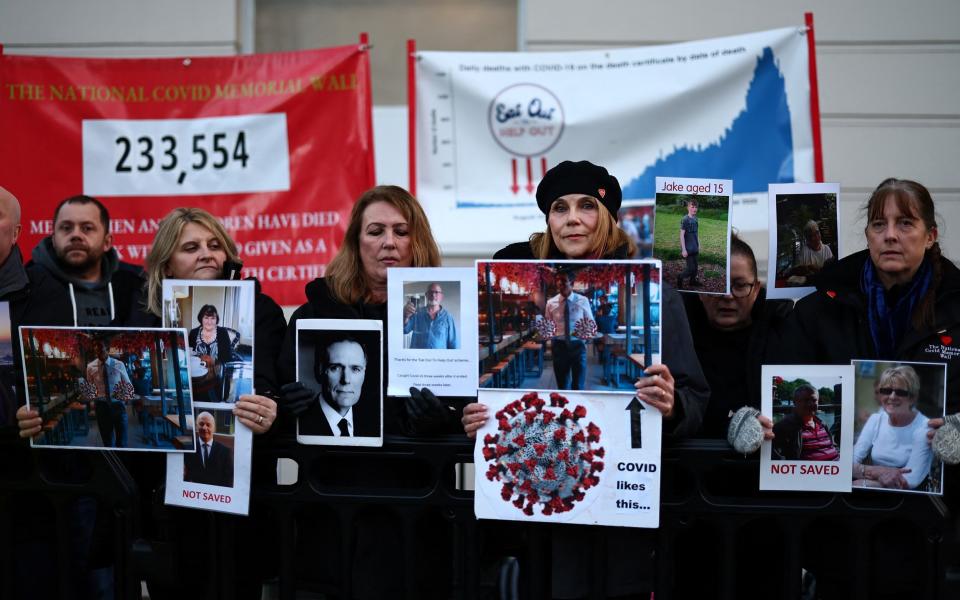
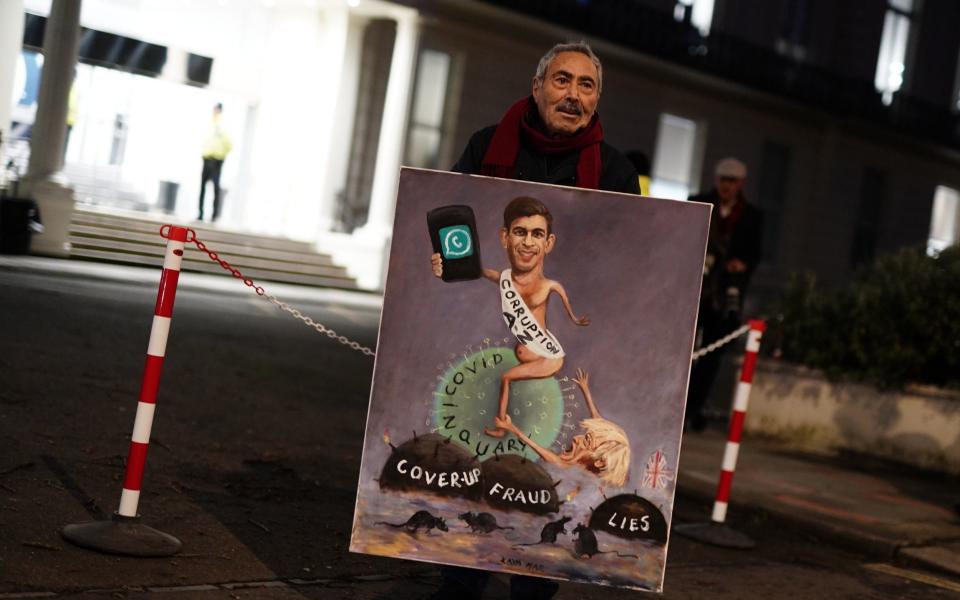
09:18 AM GMT
Good morning and welcome to The Telegraph's live coverage of the Covid Inquiry
Good morning and welcome to The Telegraph’s live coverage of the Covid Inquiry.
Prime Minister Rishi Sunak is due to be questioned today.
It comes after Boris Johnson was questioned at the Inquiry last week.

